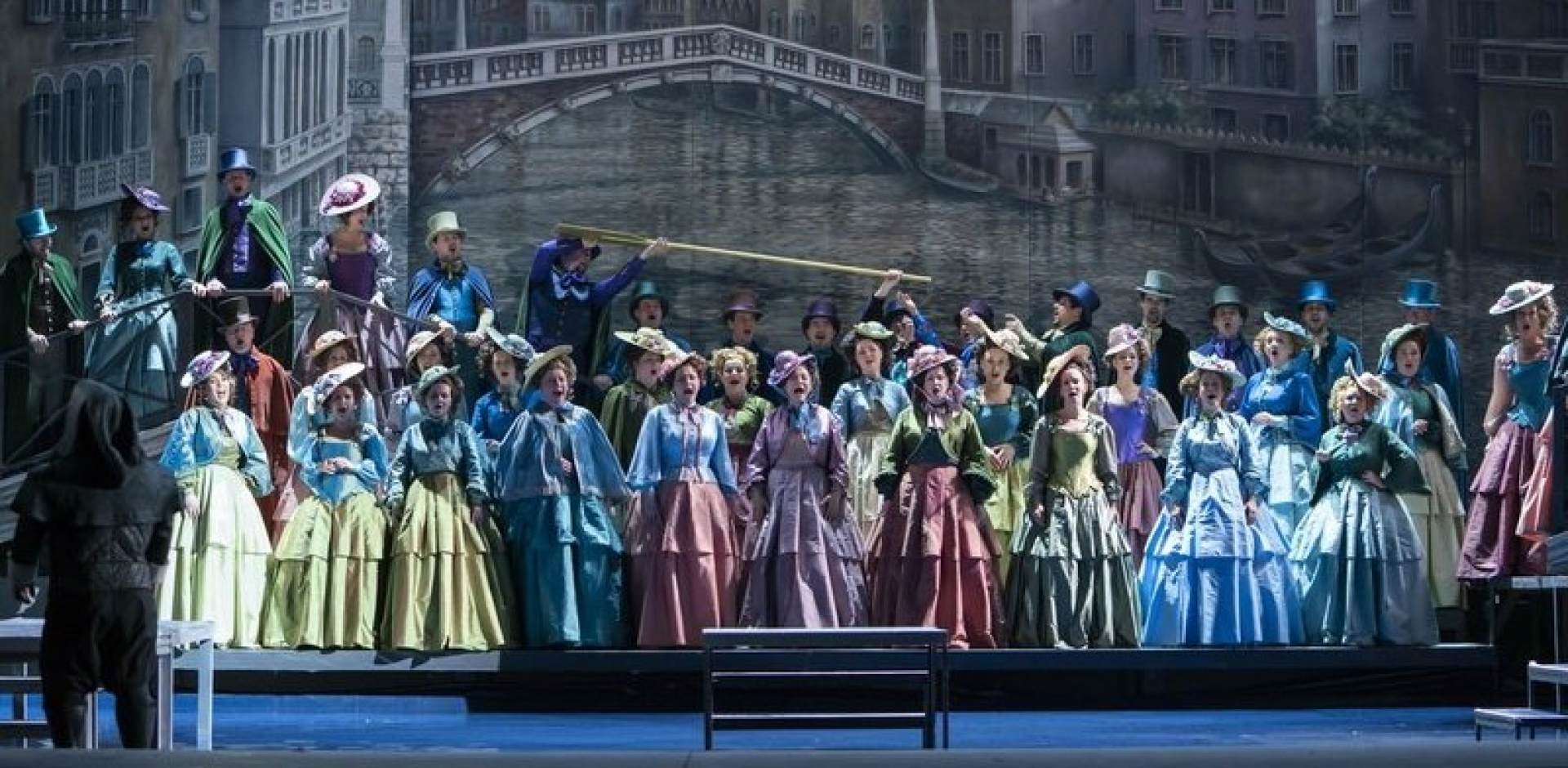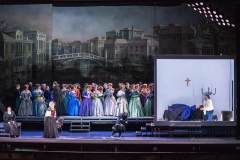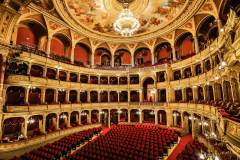La Gioconda
June 2025 | ||||||
|---|---|---|---|---|---|---|
Mo | Tu | We | Th | Fr | Sa | Su |
LA GIOCONDA - Amilcare Ponchielli
Opera in four acts, in Italian, with Hungarian, English, and Italian subtitles
Performance length: 3 hours 30 minutes, with 1 intermission.
Ponchielli's most famous opera whisks the audience back to the magical, but at the same time, dangerous Venetian Republic of the 17th century. The piece's protagonist is a street singer named Gioconda. In spite of her name, which means “the jovial one”, her life takes a tragic turn owing to the intrigues of a diabolically evil figure who is hopelessly in love with her.
Ponchielli and Boito employ nearly every available trope of grand opéra: the carnival masquerade, the love triangle, unexpected twists, poison, a blind woman denounced as a witch, stirring crowd scenes – and dance: the best-known part of the opera is the ballet interlude the Dance of the Hours.
This work in the style of French and Italian grand opera premiered in a production directed by András Almási-Tóth.
Synopsis
The opera's title translates as The Happy Woman, but is usually given in English as The Ballad Singer. However, as this fails to convey the irony inherent in the original, the Italian is usually used. Each act of La Gioconda has a title.
Place: Venice
Time: 17th century
The story revolves around a woman, Gioconda, who so loves her mother that when Laura, her rival in love for the heart of Enzo, saves her mother's life, Gioconda puts aside her own romantic love to repay her. The villain Barnaba tries to seduce Gioconda, but she prefers death.
Act 1 The Lion's Mouth
The courtyard of the Doge's Palace
During Carnival celebrations before Lent, while everyone else is preoccupied with a regatta, Barnaba, a state spy, lustfully watches La Gioconda as she leads her blind mother, La Cieca, across the Square. When his amorous advances are firmly rejected, he exacts his revenge by denouncing the old lady as a witch whose evil powers influenced the outcome of the gondola race. It is only the intervention of a young sea captain that keeps the angry mob at bay.
Calm is restored at the approach of Alvise Badoero, a member of the Venetian Inquisition, and his wife, Laura. Laura places La Cieca under her personal protection, and in gratitude the old woman presents her with her most treasured possession, a rosary. The sharp-eyed Barnaba notices furtive behaviour between Laura and the sea captain indicating a secret relationship. Recalling that Laura was engaged to the now banished nobleman Enzo Grimaldo before her forced marriage to Alvise, Barnaba realises that the sea captain is Enzo in disguise.
Barnaba confronts Enzo, who admits his purpose in returning to Venice is to take Laura and begin a new life elsewhere. Barnaba knows that Gioconda is also infatuated with Enzo and he sees an opportunity to improve his chances with her by assisting Enzo with his plan of elopement.
When Enzo has gone, Barnaba dictates a letter to be sent to Alvise, revealing his wife's infidelity and the lovers' plan of escape. He is unaware that he has been overheard by Gioconda. The act ends with Barnaba dropping the letter into the Lion's Mouth, where all secret information for the Inquisition is posted, while Gioconda laments Enzo's perceived treachery, and the crowd returns to its festivities.
Act 2 The Rosary
The deck of Enzo's ship
Enzo waits for Barnaba to row Laura out from the city to his vessel. Their joyful reunion is overshadowed by Laura's fears as she does not trust Barnaba. Gradually Enzo is able to reassure her, and he leaves her on deck while he goes to prepare for their departure.
La Gioconda has been following Laura with the intention of exacting revenge from her rival. Alvise and his armed men are also in hot pursuit, but as Gioconda is about to stab Laura she sees her mother's rosary hanging round her neck and, realizing that it was Laura who saved her mother, has an instant change of heart. She hurries Laura into her boat so that she can evade her pursuers.
Enzo returns to the deck to find that Laura has fled leaving Gioconda triumphant. Furthermore, Alvise's men are rapidly approaching. Enzo sets fire to the ship rather than let it fall into the hands of his enemies before diving into the lagoon.
Act 3 The Ca' d'Oro (House of Gold)
Alvise's palace
Laura has been captured, and her vengeful husband insists she must die by poisoning herself (effectively committing suicide and condemning herself to Hell). Once again Gioconda has followed and has found her way into the palace, this time with the intention of saving her rival. Finding Laura alone Gioconda replaces the phial of poison with a powerful drug which creates the appearance of death. The second scene begins with Alvise welcoming his fellow members of the nobility to the palace; Barnaba and Enzo are amongst those present. Lavish entertainment is provided and the act ends with the famous ballet Dance of the Hours. The mood of revelry is shattered as a funeral bell begins to toll and the body of Laura is revealed awaiting burial. A distraught Enzo flings off his disguise and is promptly seized by Alvise's men.
Act 4 The Orfano Canal
A crumbling ruin on the island of Giudecca
In exchange for Enzo's release from prison, La Gioconda has agreed to give herself to Barnaba. When Enzo is brought in, he is initially furious when Gioconda reveals that she has had Laura's body brought from its tomb. He is about to stab her when Laura's voice is heard and Gioconda's part in reuniting the lovers becomes clear. Enzo and Laura make their escape, leaving La Gioconda to face the horrors awaiting her with Barnaba. The gondoliers' voices are heard in the distance telling that there are corpses floating in the city. When Gioconda tries to leave, she is caught by Barnaba. She then pretends to welcome his arrival, but under cover of decking herself in her jewellery, seizes a dagger and stabs herself to death. In frustrated rage Barnaba tries to perpetrate one last act of evil, screaming at the lifeless body "Last night your mother offended me. I drowned her!"
Program and cast
Conductor: Balázs Kocsár
Gioconda: Zsuzsanna Ádám, Francesca Tiburzi
La Cieca, Gioconda’s blind mother: Atala Schöck
Barnaba: Csaba Szegedi
Laura Adorno: Andrea Szántó
Enzo Grimaldo: István Kovácsházi, Pavel Černoch
Alvise Badoero, chief of the State Inquisition, husband of Laura: Krisztián Cser
Zuàne, a competitor in the regatta: Boldizsár Zajkás
Isèpo, a scribe: Gergely Biri
A priest / A street singer / A voice from afar: Károly Fekete, Gergely Irlanda
Another voice from afar: Márió Matyó, János Novák
Featuring the Hungarian State Opera Orchestra and Chorus, as well as the Hungarian National Ballet
Composer: Amilcare Ponchielli
Librettist: Arrigo Boito
Director: András Almási-Tóth
Artistic consultant: Éva Marton
Set designer: Krisztina Lisztopád
Costume designer: Bori Tóth
Lighting designer: Tamás Pillinger
Choreographer: Dóra Barta
Hungarian translation by Judit Kenesey
English translation by Arthur Roger Crane
Chorus director: Gábor Csiki
Hungarian State Opera
STANDING ROOM TICKETS - INFORMATION IN CASE OF A FULL HOUSE!
If all the seats are sold out for the selected time, but you still want to see the production on that day, 84 of the extremely affordable standing seats will be sold at the theatre, 2 hours before the start of the performance, with which you can visit the gallery on the 3rd floor. Tickets can be purchased at the ticket office of the Budapest Opera House. We would like to draw your attention to the fact that the stage can only be seen to a limited extent from the standing places and the side seats, but at the same time, following the performance is also supported by television broadcasting on the spot.
The Opera House is not only one of the most significant art relic of Budapest, but the symbol of the Hungarian operatic tradition of more than three hundred years as well. The long-awaited moment in Hungarian opera life arrived on September 27, 1884, when, in the presence of Franz Joseph I. the Opera House was opened amid great pomp and ceremony. The event, however, erupted into a small scandal - the curious crowd broke into the entrance hall and overran the security guards in order to catch a glimpse of the splendid Palace on Sugar út. Designed by Mikós Ybl, a major figure of 19th century Hungarian architecture, the construction lived up to the highest expectations. Ornamentation included paintings and sculptures by leading figures of Hungarian art of the time: Károly Lotz, Bertalan Székely, Mór Than and Alajos Stróbl. The great bronze chandelier from Mainz and the stage machinery moda by the Asphaleia company of Vienna were both considered as cutting-edge technology at that time.
Many important artists were guests here including Gustav Mahler, the composer who was director in Budapest from 1887 to 1891. He founded the international prestige of the institution, performing Wagner operas as well as Magcagni’ Cavalleria Rusticana. The Hungarian State Opera has always maintained high professional standards, inviting international stars like Renée Fleming, Cecilia Bartoli, Monserrat Caballé, Placido Domingo, Luciano Pavarotti, José Cura, Thomas Hampson and Juan Diego Flórez to perform on its stage. The Hungarian cast include outstanding and renowed artists like Éva Marton, Ilona Tokody, Andrea Rost, Dénes Gulyás, Attila Fekete and Gábor Bretz.

 EN
EN DE
DE IT
IT FR
FR ES
ES RU
RU JP
JP RO
RO
 Seating plan
Seating plan 




